
https://www.youtube.com/watch?v=--a-m_9gofI
Low Potassium - Signs, Symptoms, Causes, and Treatment

Today , we're gonna talk about low potassium .
Okay ?
The signs , the symptoms , the causes , the treatment , all the details about potassium .
I've done a lot of videos on potassium .
I'm always updating my videos .
I'm finding new information , and I'm also reminding people about things that are really , really important .
And out of all the minerals , I think potassium is at the top of the list as far as importance .
So the reason why we need potassium mainly is because it's a part of a certain enzyme or a pump in all of your cells called the sodium and potassium pump .
Okay ?
That is the pump that keeps , these 2 minerals separated to a certain degree to create a battery effect in your cells .
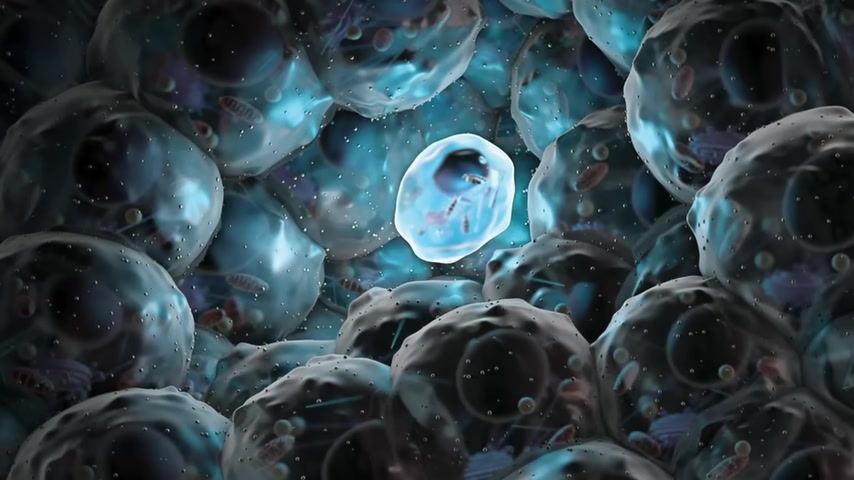
So potassium is intimately involved in the power in the cells , and I'm talking about the power to generate energy for your nervous system primarily as well as your muscular system .
Okay ?
All your muscles .
And I'm not just talking about your skeletal muscles from your legs and your arms , but the muscles in your colon , the muscles in the lung , which is the diaphragm , which is a little bit different , but that's not a skeletal muscle , but it allows you to breathe .
So that's a really , really important function right there .
It also is involved in pH , and potassium also works with other minerals like sodium , for example .
It can also work with magnesium .
And so in the diet , for example , if 1 is going too high , the other 1 will also need to go up as well .
For example , you don't have to worry about consuming too much sodium as long as your potassium is at least twice as high .

And so the average person needs like 47 100 milligrams of potassium and like half of that sodium ideally .
But that can increase if you're going up with the sodium .
But the average person is not consuming even close to what they really need of potassium .
And this is why this video is important because most people are deficient in potassium .
So you should know the symptoms .
You should know how you become deficient .
It's not always , from your diet , but the medical term for low potassium is hypocalinemia .
Okay ?
That means low potassium in your blood .
The thing you need to know with potassium is that 98% of all the potassium is located inside the cell .
Only 2% is outside the cell in your blood .
So when you get a blood test , you're really only measuring a very tiny bit , like 2% of all your potassium in your body .

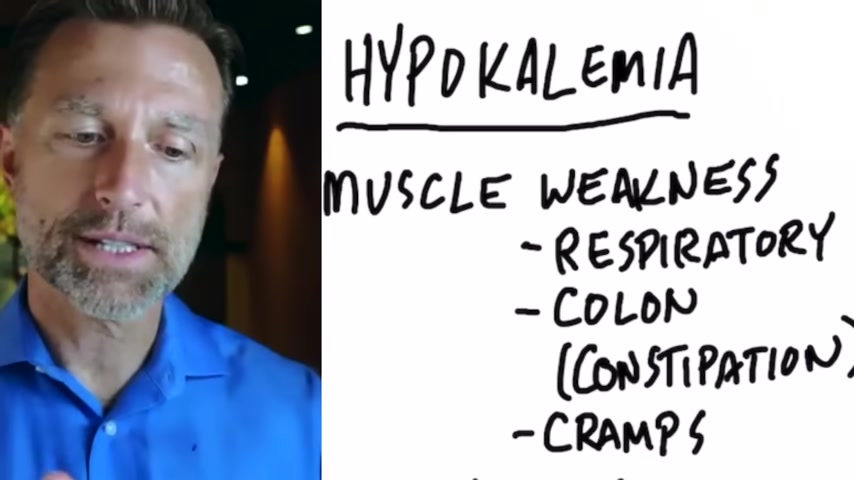
So it's not the best way to know what's going on , deeper inside the body .
An intracellular potassium test is more difficult , and sometimes it's hard to find a lab that will do that .
So let's kinda go through the symptoms of low potassium .
Okay ?
Number 1 would be muscle weakness .
Okay ?
Let's say you're climbing up the stairs and you're like , oh my gosh , my legs are just so heavy , or you're starting exercise and you just don't have the gas , you just feel kind of tuckered out .
That can be a potassium deficiency .
This is why it might be good sometimes to take an electrolyte powder with potassium to get more energy while you're exercising .
A lot of times people will feel a significant difference with that .
Now we also have your lungs , which is controlled by the diaphragm .
So in other words , a lack of potassium could affect your breathing .
Right ?
It's harder to breathe .
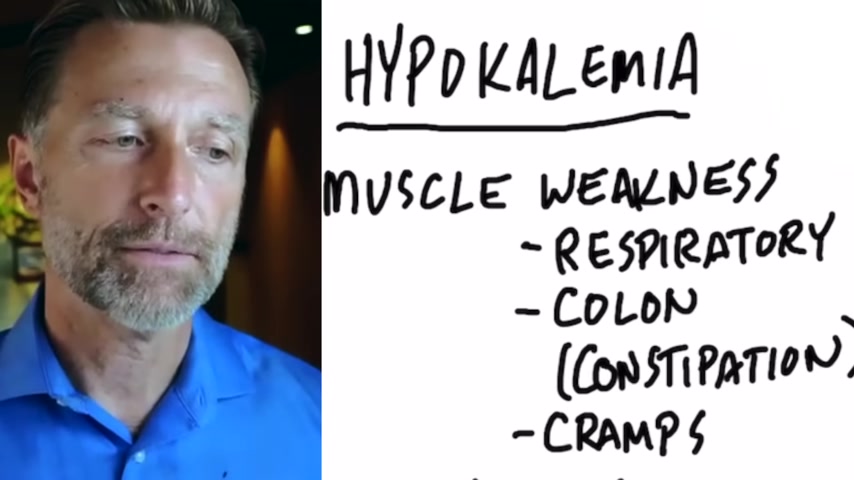
A lack of potassium can affect the colon muscles , the peristalsis , the pumping action of your digestive system , and that can show up as constipation as a symptom .
And also you can notice , cramping in your calves , in your feet , in other parts of your body .
You can even notice , twitching , but also twitching could be a lack of calcium as well , or even magnesium .
A lot of these minerals kinda cross over , so cramps in your calf could be potassium .
It could be magnesium .
It could be calcium .
So this is why the video to kind of learn a little bit more about the overview of this 1 mineral .
Another common symptom is arrhythmias , the heart rhythm .
Another 1 would be hypertension as in high blood pressure , and even as that might relate to vascular stiffness .
In other words , potassium helps keep the arteries soft , okay , to prevent high blood pressure .
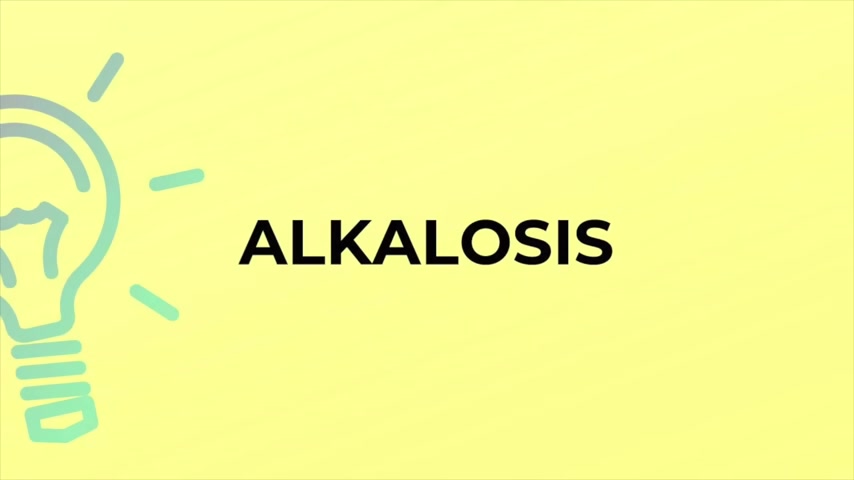
So 90% of all , hypertension is called essential , which means unknown cause .
I think a good portion of that is either a potassium deficiency , insulin resistance , or a low vitamin d situation .
Another symptom , it would be fatigue , and then another 1 , alkalosis .
You have a situation where potassium's intimately involved with helping regulate your pH .
So if your blood is a little bit too alkaline or too acid , potassium is usually involved .
If the pH is , more alkaline in your blood , okay , potassium is gonna move from your blood more into the cell .
So you'll end up with less potassium .
Potassium is also involved in the storage of sugar in your liver and in your muscles .
It's called glycogen .

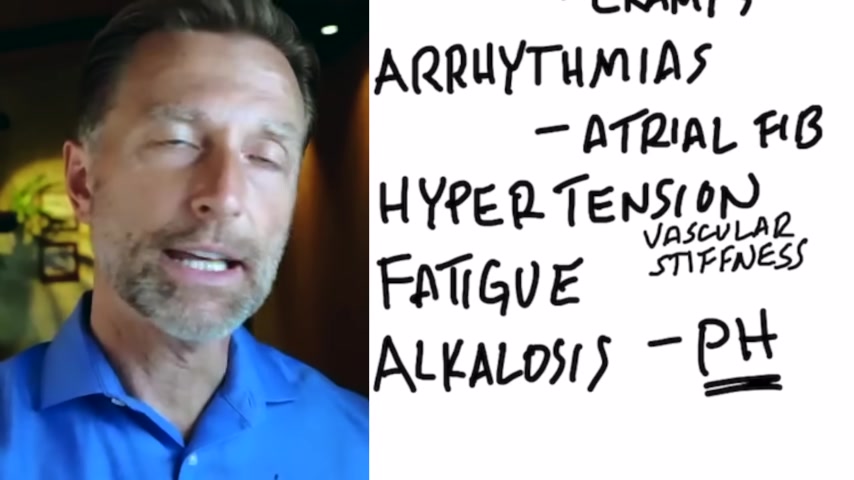
So if you're consuming sugar , you'll lose potassium in this in the sugar itself .
It kinda gets stuck in the liver and in the muscles .
It becomes unavailable to you unless you use up that sugar .
So , but that's just 1 way that you can become deficient in potassium .
Another symptom would be insomnia .
Another symptom would be a higher pulse rate .
So potassium keeps your pulse rate lower .
And another condition called pulsatile tinnitus .
Now what is that ?
That is a situation where you start hearing your pulse beats .
Okay ?
It could be a swishing or a pounding where you put your head in the pillow and you just hear your heartbeat just pounding like that .
It's not even necessarily a higher pulse rate .
You just hear or feel your heart rate .
Okay ?
That is a potassium deficiency .
Alright .
So now the question is , how do you become deficient in the first place ?

It could be because you're not consuming foods high in potassium .
That's a common cause .
And then also you're eating a lot of junk foods , which are loaded with sodium .
That really throws off your ratios .
Another few common causes would be , you're losing fluids , like either your vomit , you're doing excessive laxatives where you're you're losing , fluids or you have diarrhea .
That could be the reason why you're deficient in potassium .
Another common thing is diuretics .
Diuretics many times will pull out sodium and potassium .
Stress in general can create a potassium deficiency , and this is why a condition where you have high levels of cortisol , called Cushing's syndrome can give you signs of a potassium deficiency .
So by taking potassium , you can feel calmer .
You can have more energy .
You can have more strength in your muscles , you can have better bowel movements .
But like I mentioned before , potassium is involved with storing sugar .
So 1 way to deplete or shift the available potassium Okay ?
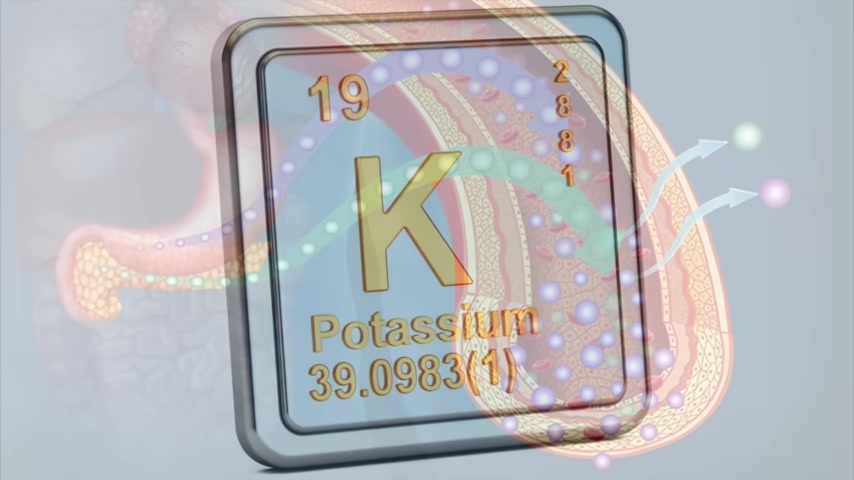
Okay ?
I have done that many times , in my twenties , in my thirties now , and I'm being very sarcastic .
I'm in my fifties , and I haven't consumed , refined sugars in many , many , many years .
But when I used to eat a lot of sugar , I had a lot of these symptoms that we're talking about .
This is why diabetics are usually always deficient in potassium , and they should be consuming a good amount of potassium , the higher their blood sugars are .
And so even potassium can help the insulin work better .
It can help the insulin resistance situation .
Now when someone starts , the ketogenic diet , they lose a lot of , glycogen .
Since a lot of that potassium is stuck in that glycogen , they're gonna also lose a lot of potassium .
This is why when you're on the ketogenic plan , I always recommend take electrolytes to get back that potassium .
So you wanna get heavy potassium , definitely a good amount of sodium as well to get your electrolytes back .

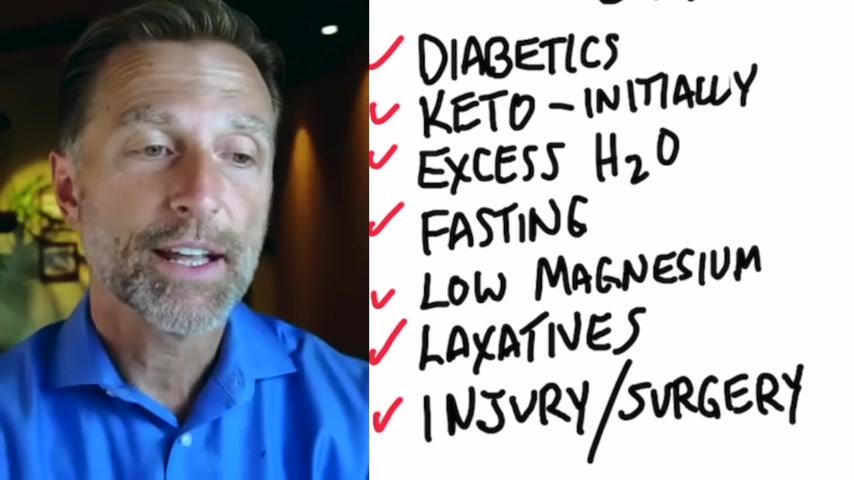
Drinking a tremendous amount of water , forcing yourself to drink like a gallon of water can definitely do it as well .
When you're doing fasting , okay , I always recommend adding more potassium , as well as , sodium , as in sea salts , through the process .
That way , you can keep your electrolytes up because you're not eating any food , And so you need to be taking these nutrients because you don't really store a lot of these electrolytes for a long period of time .
So if you're doing prolonged fasting , you could really end up with a potassium deficiency and feel faint and even pass out , you know , and that's not a good thing .
So take your electrolytes if you're fasting .
If you have low magnesium , that can affect your potassium as well .
Okay ?
Because they it takes a certain amount of magnesium to retain , potassium .
And the last thing that can affect potassium is if you get injured or you go through surgery .
Yeah .
And so that can shock the body .
It's a big , source of stress , and then you could just dump your potassium and end up with hypokalemia .
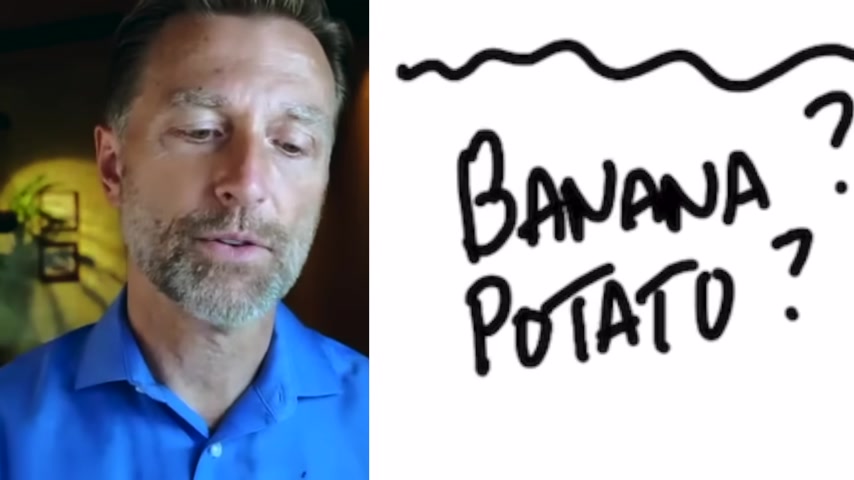
So what are the best foods to eat your potassium ?
What about a banana ?
Well , a banana has a lot of sugar and it only has like 300 milligrams for a medium sized banana .
You need 47 100 milligrams .
Okay ?
So a banana is not a good source of potassium .
What about potatoes ?
Well , potato has a good amount of potassium , but it also has all that starch .
Unless you consume a raw potato , which you're probably not gonna do , I would avoid potatoes too .
So these are the foods that are high in potassium .
At the top of the list , you have beet leaves .
If you put those in your salad , you'll have a lot of potassium .
You also have any type of leafy green is loaded with potassium .
The salads , any of the cruciferous vegetables , any of the leafy greens will give you enough potassium .
Avocados are a very good source of potassium .
Squash and lima beans have a good amount of potassium .
Now , of course , lima beans are in the bean family .
I don't really recommend consuming a lot of those .
If you're gonna have them , have a small amount .
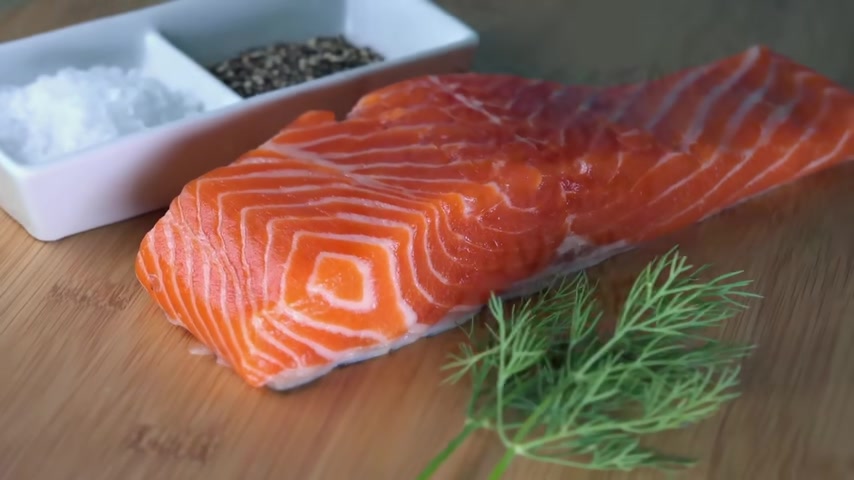
And we also have salmon , has a good amount of potassium .
So potassium is not just in vegetables , it's also in certain meats as well .
So I hope you now have a better understanding of potassium and a better appreciation of potassium .
If you haven't seen this video on electrolytes that I did , I have a very cool demo in this video to show you how potassium and other electrolytes can power your body .
Check it out .
I put it up right here .

Are you looking for a way to reach a wider audience and get more views on your videos?
Our innovative video to text transcribing service can help you do just that.
We provide accurate transcriptions of your videos along with visual content that will help you attract new viewers and keep them engaged. Plus, our data analytics and ad campaign tools can help you monetize your content and maximize your revenue.
Let's partner up and take your video content to the next level!
Contact us today to learn more.